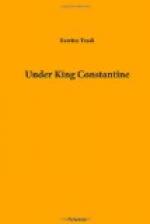And his bright armour were in readiness
For the long vigil by his arms, alone
Before the altar in that sacred place,
The holy Minster, where his father slept
First he would come, that she might bless her son.
Well did she comprehend the happiness
In his brave heart to day, the early vow
That stirred the boy so deeply, long ago,
Was near its confirmation! His intense
And solemn longing for the watch at night,
His ardent joy in knighthood, won at last,—
She shared before she saw him, with that sense
Of subtle sympathy a mother, only, knows.
She spoke her thoughts aloud in pride-thrilled tones—
“Almost a knight, my Greane, is Christalan;
How valiant, faithful, noble he has been,
And will be ever, my true-hearted son!”
“Greane! Greane! they come! I see
a dusty cloud
That hides and heralds the approach of men.
Look, is it Christalan? They come more near,
Nearer and nearer! God in Heaven! Greane,
What is it that they bring? Not Christalan?
O no; that silent form they bear so slow
Can not, and must not, be my Christalan!
Come, Greane, and contradict my eyes for me.”
Greane’s answer was a swift, confirming swoon.
Up through the gates they bore her Christalan,
Dressed in the garments of the neophyte,
That erst were spotless white, but then were soiled,
Bedraggled and dust-stained. His golden hair
A matted mass, of sunny curls unkempt,—
And yet how beautiful he was withal!
Into the hall they brought and laid him down,
While Agathar gave thanks, from her despair,
That death had not yet conquered him. He lived,
Although he spoke not, moved not, scarcely breathed.
They told her, in few words, of his brave deed.
In some lone mountain way, far from the court,
He saw a knight almost unhorsed by fraud,
And springing quickly to the knight’s relief,
Unarmed, unready, without thought of self,
He had been trampled by the maddened horse,
Whose master he had saved unfair defeat.
The leech had tended him with greatest care,
Promised him life, but never more, alas!
The power to wield his sword, or wear his arms,
The strength to walk, or run, or live the life
Of manhood as men prize it. Some deep hurt,
Beyond the sight, would ever foil his strength,
And make bold effort perilous to life.
They told her how he whiter grew, at this,
And, with the one word, “Noel-garde,”
had passed
Into the trance, like death, that held him thus
Through all the journey they had carried him.
“My valiant boy,” said Lady Agathar;
And hushed her heart, to minister to him.
Slowly, at last, the lovely eyes unclosed
The speaking beauty of their dark-blue depths,
To meet his mother’s with beseeching gaze.
“I can be true, but never valiant now,”
He said in faltering accents. “Mother mine,
There is no knight for you and my sweet Greane.
God help me!” and he turned him to the wall.




